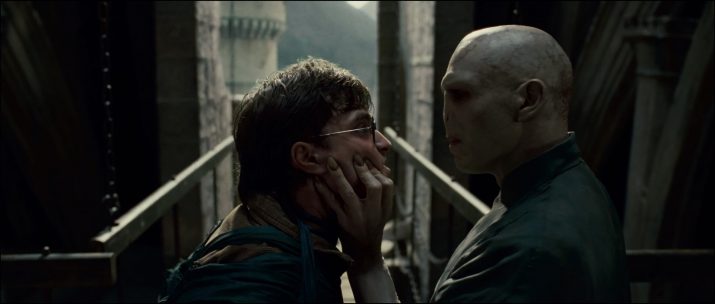Why Harry Potter is Nothing Without Voldemort
By Domenic DiNardo
September 3, 2015 • Fact checked by Dumb Little Man

Harry Potter is one of the great characters created in the history of fiction writing. We all know about the commercial success J.K. Rowling duly experienced from the Harry Potter series (over 450 million copies sold, and over $6 billion at the box office). Sometimes the commercial success overshadows the beauty and depth of the characters and story.
Harry is a repressed young boy, treated poorly by his parents, who’s called to action as he discovers he is a wizard. He attends a school to develop his talents, facing obstacles not only as most young adults do, but also in facing a powerful villain in Lord Voldemort…who intends to take over the world and bring evil upon it. Harry grows into a powerful wizard, with help from mentors, guides and friends along the way, and defeats his enemies, including Voldemort, by the end of the series.
Great story. There are many reasons to explain its greatness, but I am most fascinated by a question I am not sure most readers of the books and viewers of the films ask themselves.
Would Harry Potter BE Harry Potter without Voldemort?
Humor me for a couple minutes here as I get to the point.
By the end of the story, Harry Potter defeats the bad guys, becomes the most powerful wizard in history, saves Hogwarts, and restores peace to both the wizarding and real worlds. But what would Harry be without the bad guys?
The Hero’s Journey
In reading Joseph Campbell’s seminal work, The Hero with a Thousand Faces, Campbell describes his monomyth, called The Hero’s Journey. Over his lifetime, Campbell read, researched, and wrote about historical mythologies across religions, tribes, dynasties and empires. He found consistencies in these disparate groups….distilling down their stories to a framework called The Hero’s Journey.
In this Hero’s Journey, amongst other things, there is a hero who goes through 12 stages in the journey. Three stages in the middle of this quest are as follows:
(#6) Tests, Allies, & Enemies
(#7) The Approach
(#8) The Ordeal
These three stages are the pivotal points at which the hero experiences and transcends adversity. With “Tests, Allies, and Enemies”, the hero is being prepared to face larger obstacles. This is a stage of preparation. Preparation is the pivotal component in developing a sense of “cool”, which is one building block in developing the solid approach to using adversity to your advantage.
In “The Approach”, setbacks begin to occur, and it is up to our hero to learn from these setbacks to develop strategies that stand up to obstacles. Process and experience builds confidence, mindset, and understanding of one’s self. During this stage, the hero will fail. She will bump up against these setbacks and obstacles and potentially want to quit. This is a pivotal moment.
Finally, in “The Ordeal”, the hero is faced with his greatest struggle against the super villain. This is what puts all the building blocks together, when the hero is ready to face the toughest obstacle she may ever face.
What is the common thread?
Campbell’s “Hero’s Journey” framework only stands up IF there is a set of obstacles that the hero must face. The hero only becomes a hero if he is prepared to face this adversity, be prepared to fail, and resilient in the face of this great enemy.
The Point
Without the threat of adversity (tests, enemies, approach, and ordeal) the hero cannot develop. The hero remains average. The hero may have talent, desire, mentors, guides, friends, and opportunity, but without the obstacles he is nothing. He cannot grow.
Without Voldemort, Harry Potter is average.
Think about your own Hero’s Journey. Do you have a Voldemort? It doesn’t need to be a person. It could be a business, a project, a tool. It could even be YOU. Forces and habits inside yourself could be the most important roadblock to your goal.
You can defeat it. Be the hero.


